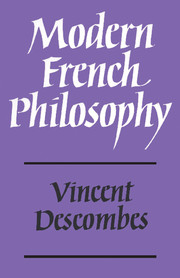Book contents
- Frontmatter
- Contents
- Foreword by Alan Montefiore
- Note on abbreviations and translation
- Introduction: Philosophy in France
- 1 The humanisation of nothingness (Kojève)
- 2 The human origin of truth (Merleau-Ponty)
- 3 Semiology
- 4 The critique of history (Foucault, Althusser)
- 5 Difference (Derrida, Deleuze)
- 6 The end of time (Deleuze, Klossowski, Lyotard)
- Index
1 - The humanisation of nothingness (Kojève)
Published online by Cambridge University Press: 05 June 2012
- Frontmatter
- Contents
- Foreword by Alan Montefiore
- Note on abbreviations and translation
- Introduction: Philosophy in France
- 1 The humanisation of nothingness (Kojève)
- 2 The human origin of truth (Merleau-Ponty)
- 3 Semiology
- 4 The critique of history (Foucault, Althusser)
- 5 Difference (Derrida, Deleuze)
- 6 The end of time (Deleuze, Klossowski, Lyotard)
- Index
Summary
The generation of the three H's was the first generation of the twentieth century. Chronology shows that the spokesmen of this generation were born at the beginning of the century (Sartre in 1905, Merleau-Ponty in 1908) and that they made themselves known during the years immediately preceding the Second World War. Older writers, already established by this date, belong to the nineteenth century; this applies to the Bergsonian generation (Bergson himself was born in 1858, and had published his doctoral thesis in 1889).
The Interpretation of Hegel
It may well be that the future of the world, and thus the sense of the present and the significance of the past, will depend in the last analysis on contemporary interpretations of Hegel's works.
(Alexandre Kojève)There is no clearer sign of the changes in mentality – the revolt against neo-Kantianism, the decline of Bergsonianism – than the triumphal return of Hegel. Banished by the neo-Kantians, he curiously, and suddenly, became a vanguard writer, quoted with respect in leading circles. Two reasons seem chiefly to account for this resurgence. One was the renewal of interest in Marxism that occurred in the wake of the Russian Revolution – part of the prestige surrounding the Bolshevik leaders reflected back upon Hegel, in so far as Lenin, for instance, had actively recommended him for study. The other was the influence of the course given by Alexandre Kojève at the Ecole Pratique des Hautes Etudes, beginning in 1933 and lasting until 1939.
- Type
- Chapter
- Information
- Modern French Philosophy , pp. 9 - 54Publisher: Cambridge University PressPrint publication year: 1981



